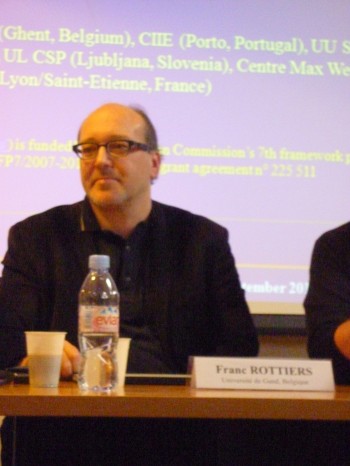drs. Franc Rottiers

RESEARCH UNITS:
Contact
Publications
pp. 1 2
-
2014
-
Laboring with others
Rottiers, F. (2014). Laboring with others. In M. M. Rawlinson, W. Vandekerckhove, R. M. Commers, & T. R. Johnston (Eds.), Labor and global justice (pp. 43–54). Latham-Boulder-New York-London: Lexington Books.
-
-
2012
-
Participating in the meaning of life: a contributor’s critique
Rottiers, F. (2012). Participating in the meaning of life: a contributor’s critique. https://doi.org/10.1007/s10699-010-9220-9The aim of this contribution is to critically examine the metaphysical presuppositions that prevail in (Stewart in Found Sci 15(4):395–409, 2010a) answer to the question are we in the midst of a developmental process? as expressed in his statement that humanity has discovered the trajectory of past evolution and can see how it is likely to continue in the future. -
Taking the refugee experience seriously
Rottiers, F. (2012). Taking the refugee experience seriously. In A. Battegay, M. Derycke, J. Roux, & M.-T. Têtu (Eds.), Testing and sensing profane citizenship in Europe (pp. 443–475). Editions Le Manuscript.
-
-
2011
-
Anticipating instrumental reason: is it still possible after adorno?
Rottiers, F. (2011). Anticipating instrumental reason: is it still possible after adorno? In D. M. Dubois (Ed.), CASYS : ABSTRACT BOOK (pp. 20–20). Liège, Belgium: CHAOS asbl.
-
-
2010
-
'Sans Papiers' sans guillemets
Rottiers, F. (2010). “Sans Papiers” sans guillemets. Cahiers Profacity, 7, 57–60.Qu'est-ce que c'est qu’un milieu traducteur ? A mon avis, le milieu traducteur est lié à la fonction d'une dynamique sémiotique locale, exprimée par une structure organisée (individu, groupe, communauté) dans laquelle les frontières d'un enregistrement deviennent visibles dans un milieu et communicables comme traduction. La conséquence de cette définition est que cette fonction doit être portée par quelqu’un. En ce sens le milieu traducteur n'est pas un concept théorique, mais atteste d’une certain forme d'engagement. Plus spécifiquement la fonction d'un milieu traducteur est déterminée par une contingence locale qui du coup fait surgir une frontière fixe d'un enregistrement possible. Les sans-papiers, les irréguliers, qu'on doit ou peut aider, ou pas. D'une part, cette fixation d'enregistrement opère dans un milieu visible et n'est communicable que par le traducteur. D'autre part, le traducteur ne contribue qu'à faire surgir les frontières d'enregistrement et ça dépend du milieu que cette traduction qui rend manifeste une limite d'enregistrement puisse devenir contagieuse en tant que telle. Remarque: ce abstrait est un extrait de l'article -
Supplementing human RIghts from an undocumented migrant point of view
Rottiers, F. (2010). Supplementing human RIghts from an undocumented migrant point of view. 385–385. American Anthropological Association. -
The hatred of democracy revisited
Rottiers, F. (2010). The hatred of democracy revisited. In N. Bechter & G. De Angelis (Eds.), Problems of Democracy: Probing the boundaries (pp. 11–18). Oxford: Inter-Disciplinary Press.In his Hatred of Democracy Jacques Rancière defines democracy as a way to have power over two ‘excesses’. On the one hand there is the excess of public participation in democratic life. On the other hand there is the excess of individualistic consumerism. Rancière points out that both are currently identified as ‘not done’ and need to be ‘controlled’. By drawing upon Rancière’s characterization of democracy, this article will lay out the conditions under which ‘control’ has emerged as the democratic principle par excellence and explore how exactly this principle limits what it means to be a citizen. The question that will be put forward is how, within a globalized world where participation in democratic life is limited and individualistic consumerism is not attainable for all, this principle can be validated. It will be argued that, while from the perspective of ‘participation’ in democratic life, this principle might have value; from the perspective of ‘contributions to society’ it has not. Given the fact that these perspectives are both ‘there’, the challenge that will be taken up in this article is to explore how exactly these two perspectives can be made intelligible. The aim is not to come to a reconciliation of two distinct perspectives, i.e. to describe what they are and offer a ‘third’ possibility, but to explore the conditions of possibility of their materialization and/or dematerialization. In order to render these conditions comprehensible - and maybe even implementable in the democratic field - it will be argued that a ‘new’ metaphysical perspective is needed to lay them bare without them being absorbed into a ‘control’ discourse. The point of departure - and arrival - of this article is to make visible and communicable those contributions that emerge in the field of social interactions of have-not people such as undocumented migrants. -
Appreciating the anticipation of citizenship expertise
Rottiers, F. (2010). Appreciating the anticipation of citizenship expertise. CASYS : INTERNATIONAL JOURNAL OF COMPUTING ANTICIPATORY SYSTEMS, 23, 32–44.Taking notice of Atlan’s definition of appreciation of anticipation, it will be argued that the appreciation of anticipation with regard to have-not people takes place exactly at the interface of the local systemic dimensions of citizenship expertise, i.e. expertise that contributes to the dynamical development of becoming a citizen, and the ideal environment of citizenship expertise, which amounts to the adherence to a viewpoint in which the notion of citizenship has to remain encapsulated by the boundaries of rather static – juridical, political, economical an social – formalities and rules, these dynamical citizenship experts are confronted with. In order to make this interface intelligible, the conditions under which community ideals (policy) and group ideals (civility) become possible, need to be revealed from an engaged position that allows for questioning and exploring what it means to be a citizenship expert. -
Material meaning
Rottiers, F. (2010). Material meaning.
-
-
2009
-
Appreciating the anticipation of citizenship expertise
Rottiers, F. (2009). Appreciating the anticipation of citizenship expertise (D. Dubois, Ed.). Liège: Chaos.
-
